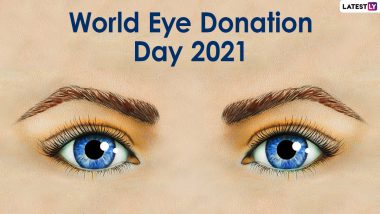"The eyes are the windows to our soul," - William Shakespeare's famous quote is indeed true. The gift of sight is the most precious among all the sense organs. And the most profound disability is considered to be the impairment of vision. Today, several people struggle with their day-to-day activities due to vision impairment. However, now medical science has advanced enough to restore the vision of a few people who suffer from blindness. Unfortunately, across the world around 39 people are blind and around 246 million people have low vision.
In India, over 1.5 million people have corneal blindness and out of which, 80 percent cases are curable. However, with corneal transplantation, corneal blindness can be treated. Almost around 60 percent of children suffer from corneal blindness. But we can surely change the suffering of several people by donating our eyes. To raise awareness about the importance of eye donation, World Eye Donation Day is observed every year on June 10. This year, on the special occasion, we need to highlight the need for eye donors in the nation and thus, here we have listed out the procedure, eligibility, and other important details for eye donation registration in India.
What is the Procedure of Eye Donation in India?
Eye donation is considered to be a noble act. One must fill a pledge form and send it to the nearest eye donation bank, as per the Eye band Association of India. They will register you as an eye donor after checking your form properly. You will be provided with an eye donor card and you will be explained all the details. They will also make you understand the importance of eye donation and they will ask to spread the awareness. If you are around the deceased and if you know someone who needs a pair of eyes to see the world, then you must remember to dial 1919 (the nearest Eye Bank) within six hours of death.
What are the Criteria for Eye Donation?
- Any people of any age and gender can donate their cornea.
- People with long-sightedness, short-sightedness or even those who have operated for cataract can also be a donor.
- Patients who are suffering from hypertension, diabetes, and asthma can also donate eyes.
However, people who are diagnosed with or died from tetanus, cholera, rabies, septicemia, acute leukemia, meningitis or encephalitis, AIDS, Hepatitis B or C cannot donate eyes. If the death happened due to drowning then also eyes cannot be donated. The Eye Bank Association of India informs the donor’s family if they find any complications.
(The above story first appeared on LatestLY on Jun 10, 2021 09:14 AM IST. For more news and updates on politics, world, sports, entertainment and lifestyle, log on to our website latestly.com).













 Quickly
Quickly


